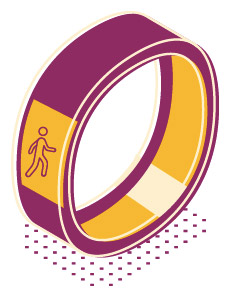Obsessed with Getting 10K Steps Every Day? Don’t!
Waters College of Health Professions

At this point, we all have some kind of pedometer or tracking device hiding in a junk drawer or in a recently deleted app. Although you might have been excited when you first used your tracker, the excitement quickly fizzled out. Do not be discouraged. This is consistent with the most recent research findings — long-term adherence to a tracking device is very low. Furthermore, if you were not achieving the goal of 10,000 steps on your device, your physical activity might even be lower after using it.
So, what should we be focusing on for our long-term health? Having a physically active lifestyle is key to disease prevention and health promotion. Sedentary behaviors, such as prolonged sitting times, are critical health threats. There is a growing body of literature that warns of the danger of sedentary behavior, linking it to adverse health outcomes such as an increased risk of cardiovascular disease, diabetes and metabolic syndrome regardless of whether physical activity recommendations are met. In other words, even if someone goes to the gym every day, one can still be at risk of disease and premature death if they engage in too much sedentary behavior. In addition to the negative physical impact, sedentary behavior has also been linked with several aspects of poorer mental health such as anxiety, depression and sleeping difficulties, independent of age, gender, level of education and physical activity. Office-based employees, or those who spend a large amount of time sitting, are particularly susceptible to this increased risk.
To reduce sedentary time, it is recommended that individuals begin with accumulating two hours each day of standing and light activity and gradually increasing this time to four hours each day. Seated-based work should be broken up using sit-stand desks, standing-based work or brief active standing breaks. In addition, employers are advised to educate their staff on the danger of how prolonged sitting increases the risk of cardiometabolic diseases and premature mortality as well as incorporate other health promotion goals including nutrition, tobacco use and stress management. Small changes can lead to big health outcomes, taking frequent activity breaks is good for not only the heart but also the mind, and keeping the body moving throughout the day reduces the implication of sedentary behaviors.
— Bridget Melton, Ed.D., Professor of Kinesiology, Dept. of Health Sciences and Kinesiology
